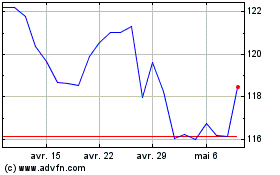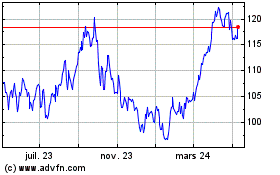ExxonMobil Chemical Announces Halobutyl Expansion at Baytown, TexasJapanese translation. Chinese translation. ExxonMobil Chemica
09 Novembre 2006 - 12:00AM
Business Wire
ExxonMobil Chemical today announced a major expansion of halobutyl
manufacturing at its plant in Baytown, Texas. The U.S. facility
will increase capacity to produce Exxon� Bromobutyl rubber by 60
percent by modifying existing equipment and adding new equipment.
The expansion is part of the company's commitment to satisfy strong
demand and high growth in the global halobutyl rubber market and
tire industry. Construction completion is anticipated during the
second quarter of 2008. "The company continues to invest in
halobutyl manufacturing at the Baytown complex, with projects
exceeding $400 million since 2000," said Art Sullivan, vice
president of ExxonMobil Chemical's Butyl Polymers Global Business.
"This further demonstrates our continued global supply commitment
to customers in the tire industry, supported by 70 years of
experience in butyl rubber research and development, services and
product know-how." The ability of halobutyl to be vulcanized with
other rubbers, providing unique properties such as low air
permeability, high heat resistance, excellent flex cracking
resistance, and processability, makes it valuable in tire inner
liner applications. The superior moisture vapor barrier properties
of halobutyl inner liners help prevent the rusting of steel cords
in the belts and carcass of passenger and truck tires. Better
inflation pressure retention (IPR) afforded by halobutyl rubber has
been demonstrated to improve the durability of aged tires.
ExxonMobil Chemical is a major supplier of halobutyl rubber to the
global tire industry and has expanded its capacity to produce this
polymer by 80 percent in the past decade. In 2002, the company
completed an expansion at Baytown that quadrupled its halobutyl
capacity. Japan Butyl Co. Ltd., an ExxonMobil Chemical joint
venture, recently completed an expansion that increased its
halobutyl production capacity to 70,000 tons a year to meet growing
demand in Asia Pacific. In another expansion at the Baytown butyl
plant, the company is doubling its capability to produce
proprietary Exxpro� specialty elastomer, used for new high air
barrier technologies for tire inner liners. Announced in 2005, the
project is targeted for completion by year end. ExxonMobil Chemical
is a global leader in technology, product quality and customer
service with petrochemical manufacturing and/or marketing
operations in more than 150 countries around the world. To find out
more about ExxonMobil Chemical visit www.exxonmobilchemical.com.
Note to the editors: ExxonMobil, the ExxonMobil logo, the
"Interlocking X", Exxpro, and Exxon Bromobutyl are trademarks or
registered trademarks of Exxon Mobil Corporation or its affiliates.
The term "ExxonMobil Chemical" refers collectively to some or all
of the companies affiliated with Exxon Mobil Corporation which have
chemical manufacturing and/or marketing operations around the
world. ExxonMobil Chemical today announced a major expansion of
halobutyl manufacturing at its plant in Baytown, Texas. The U.S.
facility will increase capacity to produce Exxon(TM) Bromobutyl
rubber by 60 percent by modifying existing equipment and adding new
equipment. The expansion is part of the company's commitment to
satisfy strong demand and high growth in the global halobutyl
rubber market and tire industry. Construction completion is
anticipated during the second quarter of 2008. "The company
continues to invest in halobutyl manufacturing at the Baytown
complex, with projects exceeding $400 million since 2000," said Art
Sullivan, vice president of ExxonMobil Chemical's Butyl Polymers
Global Business. "This further demonstrates our continued global
supply commitment to customers in the tire industry, supported by
70 years of experience in butyl rubber research and development,
services and product know-how." The ability of halobutyl to be
vulcanized with other rubbers, providing unique properties such as
low air permeability, high heat resistance, excellent flex cracking
resistance, and processability, makes it valuable in tire inner
liner applications. The superior moisture vapor barrier properties
of halobutyl inner liners help prevent the rusting of steel cords
in the belts and carcass of passenger and truck tires. Better
inflation pressure retention (IPR) afforded by halobutyl rubber has
been demonstrated to improve the durability of aged tires.
ExxonMobil Chemical is a major supplier of halobutyl rubber to the
global tire industry and has expanded its capacity to produce this
polymer by 80 percent in the past decade. -- In 2002, the company
completed an expansion at Baytown that quadrupled its halobutyl
capacity. -- Japan Butyl Co. Ltd., an ExxonMobil Chemical joint
venture, recently completed an expansion that increased its
halobutyl production capacity to 70,000 tons a year to meet growing
demand in Asia Pacific. In another expansion at the Baytown butyl
plant, the company is doubling its capability to produce
proprietary Exxpro(TM) specialty elastomer, used for new high air
barrier technologies for tire inner liners. Announced in 2005, the
project is targeted for completion by year end. ExxonMobil Chemical
is a global leader in technology, product quality and customer
service with petrochemical manufacturing and/or marketing
operations in more than 150 countries around the world. To find out
more about ExxonMobil Chemical visit www.exxonmobilchemical.com.
Note to the editors: ExxonMobil, the ExxonMobil logo, the
"Interlocking X", Exxpro, and Exxon Bromobutyl are trademarks or
registered trademarks of Exxon Mobil Corporation or its affiliates.
The term "ExxonMobil Chemical" refers collectively to some or all
of the companies affiliated with Exxon Mobil Corporation which have
chemical manufacturing and/or marketing operations around the
world.
Exxon Mobil (NYSE:XOM)
Graphique Historique de l'Action
De Juin 2024 à Juil 2024

Exxon Mobil (NYSE:XOM)
Graphique Historique de l'Action
De Juil 2023 à Juil 2024
